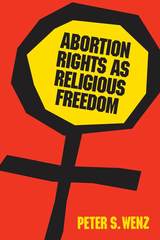
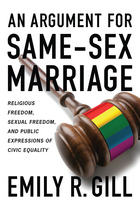
The relationship between religious belief and sexuality as personal attributes exhibits some provocative comparisons. Despite the nonestablishment of religion in the United States and the constitutional guarantee of free exercise, Christianity functions as the religious and moral standard in America. Ethical views that do not fit within this consensus often go unrecognized as moral values. Similarly, in the realm of sexual orientation, heterosexuality is seen as the yardstick by which sexual practices are measured. The notion that "alternative" sexual practices like homosexuality could possess ethical significance is often overlooked or ignored.
In her new book, An Argument for Same-Sex Marriage, political scientist Emily Gill draws an extended comparison between religious belief and sexuality, both central components of one’s personal identity. Using the religion clause of the First Amendment as a foundation, Gill contends that, just as US law and policy ensure that citizens may express religious beliefs as they see fit, it should also ensure that citizens may marry as they see fit. Civil marriage, according to Gill, is a public institution, and the exclusion of some couples from a state institution is a public expression of civic inequality.
An Argument for Same-Sex Marriage is a passionate and timely treatment of the various arguments for and against same-sex marriage and how those arguments reflect our collective sense of morality and civic equality. It will appeal to readers who have an interest in gay and lesbian studies, political theory, constitutional law, and the role of religion in the contemporary United States.
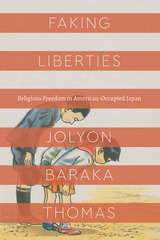
Through a fresh analysis of pre-war Japanese law, Jolyon Baraka Thomas demonstrates that the occupiers’ triumphant narrative obscured salient Japanese political debates about religious freedom. Indeed, Thomas reveals that American occupiers also vehemently disagreed about the topic. By reconstructing these vibrant debates, Faking Liberties unsettles any notion of American authorship and imposition of religious freedom. Instead, Thomas shows that, during the Occupation, a dialogue about freedom of religion ensued that constructed a new global set of political norms that continue to form policies today.

At a time when the concept of religion-based politics has taken on new and sometimes ominous tones—even within the United States—it is not only right, but also urgently necessary that William Lee Miller revisit his profound exploration of the place of religious liberty and church and state in America. For this revised edition of The First Liberty, Miller has written a pointed new introduction, discussing how religious liberty has taken on deeper dimensions in a post-9/11 world. With new material on recent Supreme Court cases involving church-state relations and a new concluding chapter on America's religious and political landscape, this volume is an eloquent and thorough interpretation of how religious faith and political freedom have blended and fused to form part of our collective history-and most importantly, how each concept must respect the boundaries of the other.
Though many claim the United States to be a "Christian Nation," Miller provides a fascinatingly vivid account of the philosophical skirmishes and political machinations that led to the "wall of separation" between church and state. That famous phrase is Jefferson's, though it does not appear in the Declaration of Independence nor in the Constitution. But Miller follows this seminal idea from three great standard-bearers of religious liberty: Jefferson, Madison, and Roger Williams. Jefferson, who wrote the Virginia Statute for Religious Freedom, the precursor of the First Amendment of the Constitution; James Madison, who was politically responsible for Virginia's acceptance of religious liberty and who, a few years later, helped draft the Bill of Rights; and the even earlier figure, the radical dissenter Roger Williams, who propounded the idea of religious freedom not as a rational secularist but out of a deeply held spiritual faith.
Miller re-creates the fierce and vibrant debate among the founding fathers over the means of establishing public virtue in the absence of established religion—a debate that still reverberates in today's passionate arguments about civil rights, school prayer, abortion, Christmas crèches, conscientious objection during warfare—and demonstrates how the right to hold any religious belief has dynamically shaped American political life.
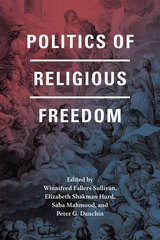
The fruits of the three-year Politics of Religious Freedom research project, the contributions to this volume unsettle the assumption—ubiquitous in policy circles—that religious freedom is a singular achievement, an easily understood state of affairs, and that the problem lies in its incomplete accomplishment. Taking a global perspective, the more than two dozen contributors delineate the different conceptions of religious freedom predominant in the world today, as well as their histories and social and political contexts. Together, the contributions make clear that the reasons for persecution are more varied and complex than is widely acknowledged, and that the indiscriminate promotion of a single legal and cultural tool meant to address conflict across a wide variety of cultures can have the perverse effect of exacerbating the problems that plague the communities cited as falling short.
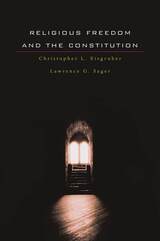
Religion has become a charged token in a politics of division. In disputes about faith-based social services, public money for religious schools, the Pledge of Allegiance, Ten Commandments monuments, the theory of evolution, and many other topics, angry contestation threatens to displace America's historic commitment to religious freedom. Part of the problem, the authors argue, is that constitutional analysis of religious freedom has been hobbled by the idea of "a wall of separation" between church and state. That metaphor has been understood to demand that religion be treated far better than other concerns in some contexts, and far worse in others. Sometimes it seems to insist on both contrary forms of treatment simultaneously. Missing has been concern for the fair and equal treatment of religion. In response, the authors offer an understanding of religious freedom called Equal Liberty.
Equal Liberty is guided by two principles. First, no one within the reach of the Constitution ought to be devalued on account of the spiritual foundation of their commitments. Second, all persons should enjoy broad rights of free speech, personal autonomy, associative freedom, and private property. Together, these principles are generous and fair to a wide range of religious beliefs and practices.
With Equal Liberty as their guide, the authors offer practical, moderate, and appealing terms for the settlement of many hot-button issues that have plunged religious freedom into controversy. Their book calls Americans back to the project of finding fair terms of cooperation for a religiously diverse people, and it offers a valuable set of tools for working toward that end.
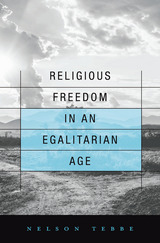
Tensions between religious freedom and equality law are newly strained in America. As lawmakers work to protect LGBT citizens and women seeking reproductive freedom, religious traditionalists assert their right to dissent from what they see as a new liberal orthodoxy. Some religious advocates are going further and expressing skepticism that egalitarianism can be defended with reasons at all. Legal experts have not offered a satisfying response—until now.
Nelson Tebbe argues that these disputes, which are admittedly complex, nevertheless can be resolved without irrationality or arbitrariness. In Religious Freedom in an Egalitarian Age, he advances a method called social coherence, based on the way that people reason through moral problems in everyday life. Social coherence provides a way to reach justified conclusions in constitutional law, even in situations that pit multiple values against each other. Tebbe contends that reasons must play a role in the resolution of these conflicts, alongside interests and ideologies. Otherwise, the health of democratic constitutionalism could suffer.
Applying this method to a range of real-world cases, Tebbe offers a set of powerful principles for mediating between religion and equality law, and he shows how they can lead to workable solutions in areas ranging from employment discrimination and public accommodations to government officials and public funding. While social coherence does not guarantee outcomes that will please the liberal Left, it does point the way toward reasoned, nonarbitrary solutions to the current impasse.
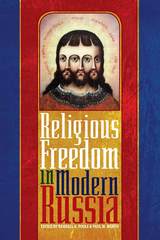
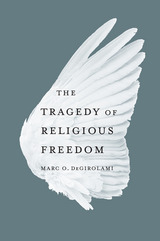
When it comes to questions of religion, legal scholars face a predicament. They often expect to resolve dilemmas according to general principles of equality, neutrality, or the separation of church and state. But such abstractions fail to do justice to the untidy welter of values at stake. Offering new views of how to understand and protect religious freedom in a democracy, The Tragedy of Religious Freedom challenges the idea that matters of law and religion should be referred to far-flung theories about the First Amendment. Examining a broad array of contemporary and more established Supreme Court rulings, Marc DeGirolami explains why conflicts implicating religious liberty are so emotionally fraught and deeply contested.
Twenty-first-century realities of pluralism have outrun how scholars think about religious freedom, DeGirolami asserts. Scholars have not been candid enough about the tragic nature of the conflicts over religious liberty—the clash of opposing interests and aspirations they entail, and the limits of human reason to resolve intractable differences. The Tragedy of Religious Freedom seeks to turn our attention from abstracted, absolute values to concrete, historical realities. Social history, characterized by the struggles of lawyers engaged in the details of irreducible conflicts, represents the most promising avenue to negotiate legal conflicts over religion. In this volume, DeGirolami offers an approach to understanding religious liberty that is neither rigidly systematic nor ad hoc, but a middle path grounded in a pluralistic and historically informed perspective.
READERS
Browse our collection.
PUBLISHERS
See BiblioVault's publisher services.
STUDENT SERVICES
Files for college accessibility offices.
UChicago Accessibility Resources
home | accessibility | search | about | contact us
BiblioVault ® 2001 - 2024
The University of Chicago Press









